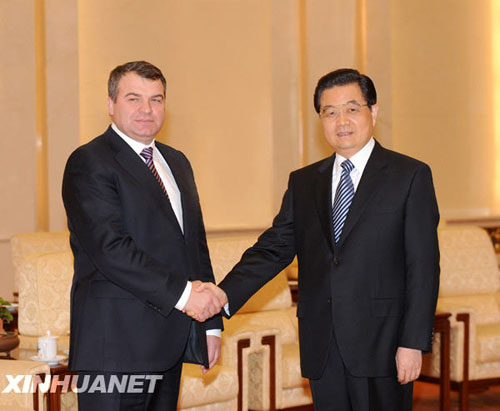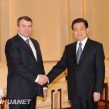
Recent Trends in Russo-Chinese Military Relations
Publication: China Brief Volume: 9 Issue: 2
By:

The Russo-Chinese relationship is a multi-dimensional one. Thus progress in each aspect of those ties is uneven. For instance, Russia has consistently failed to satisfy China’s demands for energy, which Russia regards as being excessively one-sided insofar as the apportionment of benefits is concerned. China has long demanded that it pay below market prices and Russia has largely resisted yielding to that demand. On the other hand, the issue of arms sales seemingly is an area where Russia has successfully sold many weapons to China and gained valuable revenues while China gains weapons and technologies plus know-how in designing them. Nevertheless, a closer examination of recent developments in Russian arms sales to China suggests trends parallel those in the energy sector: Russia is failing to meet Chinese demands. Just as Moscow now seeks Chinese loans for its energy companies and investments in Russian Asia, its arms sales to China is falling victim to its angst at the United States and its arms producers’ need for cash even as it builds up a formidable military force that it knows one day could be deployed against it.
From 1990-2007 Russia sold China $25 billion of weapons. Nonetheless there were many production problems albeit largely unreported ones (Interfax-AVN, December 12, 2008). For example, the three-way contract with Uzbekistan and Russia to build Il-76 military transports and Il-78 tankers was effectively annulled by Tashkent. So while Russia fulfilled its contractual obligation to make the engines, nobody made the airframes (Interfax-AVN, December 12, 2008). In other cases 200 Su-27SK fighter jets were to be made under license but only 105 were completed “whereupon China unilaterally terminated the conract.” Those sales fell precipitously to just $700 milliion of new contracts in 2007 (Interfax-AVN, December 12, 2008; FBIS SOV, December 12, 2008; Vedomosti, December 10, 2008; FBIS SOV, December 10, 2008). This prospect caused considerable alarm in Russia’s defense industrial complex, especially in the current economic crisis. China, having bought many weapons platforms, now does not need them but rather seeks the technologies associated with them, the right to joint development and production, and Russian state of the art weapons (Interfax-AVN June 27, 2007; Interfax, December 12, 2008; FBIS SOV, December 12, 2008). Indeed, China had already begun to reverse engineer these Russian weapons and proudce them by itself thereby infringng upon Russia’s intellectual property and causing the prospect of millions of dollars in losses.
Consequently there is currently not one single large-scale defense contract with China as in the past. Worse yet, apparently Russian officials are unable to decide what systems should be sold to China. The revelations of defective weapon sales to India and Algeria coupled with Russia’s habit of abruptly raising prices for its products and then demanding payment lest the production line shut down raises question of its overall rellaibility as an arms seller—not just to China. Yet beyond this “there is currently no effective communication channel or mechanism to deal with the problems, not even at the top leadership levels” [1]. Indeed, there had been no meetings of the full bilateral militry commission since 2005.
Therefore this issue became a serious concern for Moscow, especially as it still held back from selling Beijing the most sophisticated and latest technology like what it sells to India. At the same time there also appears to be signs of a subterranean disquiet about the rapid growth of Chinese power (Nezavisimaya Gazeta, January 30, 2008; FBIS SOV, January 31, 2008; The Weekly Standard, February 5, 2008). Although some analysts argue that Russia is unafraid of Chinese military power, that is not the case with regard to Chinese nuclear and missile policies since Beijing’s expanding arsenal clearly has triggered Moscow’s disquiet which, however, it dare not publicize [2]. But since Russian defense exports depend on sales to China, especially under conditions of growing tension with the West and now the global economic crisis, and nobdoy else will export weapons to China, it was always likely that some compromise weighted toward Beijing would ensue. During Prime Minister Wen Jiabao’s visit to Russia in October 2008, Moscow announced that arms sales will continue through 2015 without problems, a trend that both sides welcome (Interfax, October 24, 2008).
In December 2008 Russian Defense Minsiter Anatoly Sedyukov led a delegation to Beijing and the first meeting of the bilateral Military Commission since 2005. Those meetings reviewed the entire inventory of arms sales and apparently led both sides to agree in the field of high technologies on both sides, step up cooperation to a higher qualitiatively new level (i.e. newer Russian models and weapons, and jointly develop high-tech products). Although no new contracts were signed at those meetings, negotiations are already underway on many new contracts (ITAR-TASS, December 12, 2008; FBIS SOV, December 12, 2008; ITAR-TASS, December 13, 2008; FBIS SOV, December 13, 2008; Kommersant, December 12, 2008). Reportedly Russia will expand bilateral military cooperation and defense and security cooperation within the Shanghai Cooperation Organization framework so that both sides will play a bigger role in Eurasia’s security agenda (Xinhua News Agency, December 10, 2008).
Specifically, China will continue producing Su-27 and Su-30 fighter jets under license, and will cooperate with Russia across the spectrum of Sukhoi aircraft, including the SU-33 and multi-role Su-35 fighter, i.e. Russia’s newest models, project 677E submarines and elements of China’s aircraft carrier program, e.g. carrier-based aircraft on the Su-33. China could also be interested in obtaining the TU-22M3 missile armed naval aircraft with new heavy anti-ship intermediate range missiles, project 971 and 949a multi-role nuclear powered submarines, and the MiG-31 Interceptor. In 2010 China will also receive the Il-76 military transports and Il-78 tanker which were contracted for but encountered production difficulties (RIA Novosti, December 12, 2008; Interfax-AVN Online, December 12, 2008; FBIS SOV, December 12, 2008).
Thus it appears that Russian angst with the United States, Moscow’s need for support against America, and desire to show Washington that it has other international options, plus the distress that arms manufacturers have felt due to decreased sales, and the looming economic crisis have led Moscow to sell China most—if not all—of what it wanted in the way of access to high-tech and new weapons from Russia which will now aid it to challenge the U.S. Navy, Taiwan, other Asian players, and develop enhanced capabilities for power projection. Meanwhile it remains unclear if Russia has really resolved the intellectual property issue of Chinese copying of Russian systems (FBIS SOV, December 12, 2008). The catch for Russia is overcoming its own production bottlenecks that apparently obstructed previous programs’ full reailzation in order to actualize the arms sellers and producers’ revenues (ITAR-TASS, December 12, 2008; FBIS SOV, December 12, 2008). But now Russia has had to deny that it will supply China with nuclear submarines because of the invitable foreign disquiet that reports of these agrements generated abroad (ITAR-TASS, December 15, 2008; FBIS SOV, December 15, 2008). Nonetheless Russia will now actively support the further growth of Chinese military power even though it acknowledges that this power represents a threat to its own interests.
In this respect arms sales parallells energy developments. Russia’s inability to execute its contracts due to poor economic governance and policy, coupled with its belligerent stance toward the West may allow it to insist on its sovereign independence, but actually its policy amounts to little more than ‘splendid isolation’. Russia appears increasingly compelled to yield to China whether it be on energy, missile defenses, or arms sales even as its defense policies acknowledge, in practice if not word, a rising Chinese threat [3]. Ultimately Russia is riding the dragon but can it alight in time before it bites?
Notes
1. Jeff Chen, “Russia-India, Russia-China Military Cooperation Running Into Difficulties,” Toronto, Kanwa Intelligence Review Internet, in English, March 30-April 13, 2008, FBIS SOV, April 5, 2008.
2. Stephen Blank, “Russia’s Security Dilemmas in Asia,” Forthcoming in Pacific Focus argues for mounting concern about nuclear and missile programs.
3. Stephen Blank, ”The Russo-Chinese Energy Follies,” Jamestown China Brief VIII, No. 23, December 8, 2008; Stephen Blank, ”Russia’s Strategic Dilemmas in Asia,” Pacific Focus, XXIII, NO. 3, December, 2008, pp. 271-293; Stephen Blank, “Strategic Rivalry in the Asia-Pacific Theater: A New Nuclear Arms Race,?” Korean Journal of Defense Analysis, XX, NO. 1, Spring, 2008, pp. 27-46.
[The views expressed here do not represent those of the U.S. Army, Defense Department, or the U.S. Government.]





